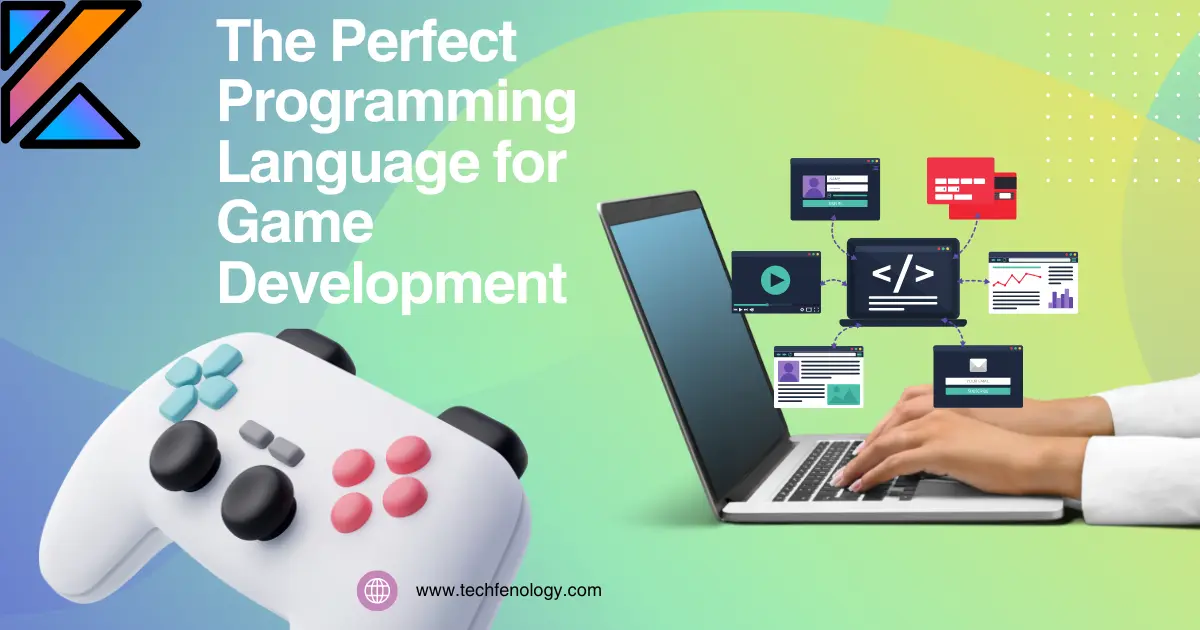
The Perfect Programming Language for Game Development
A Complete Guide on Choosing the Best Programming Language for Game Development As a game developer, whatever your experience level may be in this field of development or however you presented yourself to the world that day with your head up high and all those thingys can do it for-ye-will attitude…well ha-alright! Selecting some programming language is pretty critical when considering developing great exciting games. This guide will look into where game developers can start with a programming language list available and will provide help to navigate you through the decision-making process.
The programming language you choose for your game development plays a significant role in optimizing the performance, efficiency and quality of games. Different Programing language can provide different kinds of features and power that suits a variety of game genres and platforms. Every language is good and bad in its own way, so the key to finding a decent decision has always been in being aware of languages pros and cons.
This guide will go over leading languages: C++, C#, Java, Python and determine which one that works best for category of type you seek to develop. We will also value the game engines it can work with, how easy is to use them and whether there is any community behind as well as learning materials. At the end of this manual, you will be able to distinguish which programming language is best suited for game development in your case.
With that, let me introduce you to the programming language which will turn your game development plans into a reality!
How to Decide on the Language for Game Programming
So, before you make your final decision on the programming language to use for game development. Which programming language to use plays a considerable role in the development of your game as well – ranging from how much time it will take to create games, its performance and compatibility with other game engines and libraries or not.
The most important is which platform you are targeting to release the game in. Given its natural language, and different environments (i.e. desktop / mobile) have their own way to request performance or optimisation improvements For example, if you’re developing a game for iOS then it makes sense to choose the language that fits neatly into Apple’s development ecosystem (Swift or Objective-C).
The genre (and its complexity) of the games is another vital factor. Some programming languages might be well suited for an individual type of game, a real-time strategy or first-person shooter or even puzzle games. Some examples are low-level languages like Programming C++ which may be more suitable for high performance graphics heavy games, while higher level programming languages such as Python to Javascript may suit rapid prototyping or web based casual games.
Also, take note of learning and community support within the programming language. A language with a more entry level syntax can be beneficial as well as one that has a large following so you have access to resources and support. Built on the shoulders of a language with years of learning material, libraries and tools certainly accelerates development process.
Popular programming languages for game development
In game development, some of the most popular and widely used programming languages are as follows Every of them has its own pros and cons as well some cool features in use-cases. So, today in this section we are going to look into some of the most used programming languages for game development and their attributes as well.
C++: The industry standard for game development
The standard industry was built on C++, so it really is no surprise that this programming language claims to be powerful. Powerful Low-Level LanguageThat enables you to write high-performance, efficient code directly accessing system resources. High-performance, graphics-intensive games can work particularly well with C++ because it enables precise memory management and control over hardware-level operations.
The largest benefit of using C++ is its superior performance – a key criterion for games that need fluid frame rates, minimal latency and fast controls. Another benefit of C++ are the libraries, tools and frameworks available in this ecosystem for game-specific applications such as DirectX or OpenGL (or even Unreal Engine) which can greatly increase your productivity.
That said, C++ also relatively low level compared to other languages; so you will have a more difficult time in general using it. C++ requires developers to learn about memory management and pointers, among other things. So much that it becomes idiosyncratic, and as a consequence may obfuscates the most direct path to what is good with something else not so great at all. This can make choosing ELK over other methods less appealing for someone new like me or more immediately advanced developers who want rapid prototyping ease of use fast.
Java: A cross-platform language for game development
Such is the case with Java, a versatile language that has permeated throughout game development albeit primarily in places like cross-platform and mobile games. The fact that Java is platform-independent and comes with a great standard library helps, accompanied by the large community you can always find help from but which also makes it one of the best choices for creating games if these need to run on different devices and OSes.
One of the primary advantages that comes with Java, is its write once and run anywhere approach – this allows developers to create games in a way from where they can be easily moved over different platforms without having making major alterations on their codebase lodgings. This is very helpful for developers appealing a broad spectrum of devices like smartphones, tablets and even web browsers.
Also, Java is an object-oriented language with all its benefits and strong type-checking features to help developers write maintainable game code that scales as well. The language also enjoys is supported by a rich ecosystem of libraries, frameworks and tools which can help you accelerate the game development process (e.g. LibGDX or jMonkeyEngine).
Python: A beginner-friendly language for game development
Python is a high-level, interpreted programming language that has also found its place within the game development community (especially among beginners and hobbyists). As a result of its simple and readable syntax, together with the great standard library it provides as well an unlimited count of 3rd party libraries allows Python to be effective for rapid prototyping even up to game jams or educational proposes.
Python is very accessible this makes it one of the best Python game development advantages. A lot of novice programmers find that Python’s specific syntax is easier to wrap their head around than some other lower level languages like C++ or Java. This is fantastic for those who are just getting into game development, and they wish to make simple games fast without even learning complex language features.
In addition to this, Python is not just limited in scope for the game development and has wide usage as a language from data analysis software developer, machine learning programmer to web developers. This interdisciplinarity can be great for game developers interested in investigating new technologies and add them into their projects, as many VL/ST applications are not yet widely elaborated.
JavaScript: A language for web-based game development
It is no secret that JavaScript has picked up demand in web games development. As HTML5 has become more widely supported and browsers have grown increasingly powerful, JavaScript is now a very viable option when creating games that can be played directly in the web browser without plugins or other downloads.
A big plus for JS as a game development tool is the presence of it everywhere. JavaScript, as the most popular web language in general has broad support and a sprawling set of libraries, frameworks and tools with things like Phaser. x using the Phaser JavaScript Game Framework or PixiJS that can simplify game development significantly.
Finally, online games developed in JavaScript are also easily available to be played across multiple platforms (desktop web and mobile) without having the players downloading or installing a specific platform version. Clearly this marks JavaScript as a viable choice for game developers looking to low barrier of entry and potentially large audience size.
Now you may use JavaScript for creating web-based games, but be aware that its not so great to create some high performance or graphics intensive game in it. In that cases another language is good, for example C++ or C.
Other programming languages for game development
Game Development In Other Programming LanguagesWhile the languages discussed here are amongst some of the preferred for game development, there are lots of various other languages that have secured their area in this industry. These include:
- Rust: A systems programming language with focus on performance, safety and concurrent handling of tasks that makes it interesting candidate for all game developers but in particular those who are interested building very low level engines/libraries.
- Godot: A recent favourite that is open-source engine, and uses its own scripting language called Godot Script (which looks a lot like Python in syntax but much cooler with types). Many indie game developers and hobbyists prefer Godot.
- Lua: Lightweight, embeddable scripting language; used in tandem with other programming languages like C++ or C for game script extensions.
- Swift: Developed by Apple to be the go-to language for (primarily game and app) developers targeting iOS, macOS or other related platforms. Swift often earns high marks in Apple-focused game dev circles for its modern syntax and robust type-checking capabilities.
Of course, that is just the tip of programming languages for game development. There are many reasons of choice with the limiting factor being determined by target platform, type and genre of the game, team skills or what you feel most comfortable with.
Conclusion: Choosing the right programming language for your game development needs
This is critical and really impacts your game development project when you choose a programming language. When you weigh the factors given below – performance, platform support, learning curve and community strength in Godot vs. Unity comparison, hopefully it will better help you recognize which is poised to be best aligned with your game development goals or constraints
Though the most commonly used languages include C++, Java, Python and JavaScript – but there is a long list of other alternatives too; every one having its own strengths as well as weaknesses. Take a good look at what your game needs and at your team’s skills (and hearts), I hope that this could make it easier for you to choose the right programming language for whatever project are working on.
Because, in the end there are no one-size-fits-all answer to whats a programming language. But it should be considered, and all the conditions of your game development path are one of those things. Now that you are familiar with the strengths and weaknesses of both languages, use them for when they will make your game development pipeline more known to be efficient, effective or successful.
